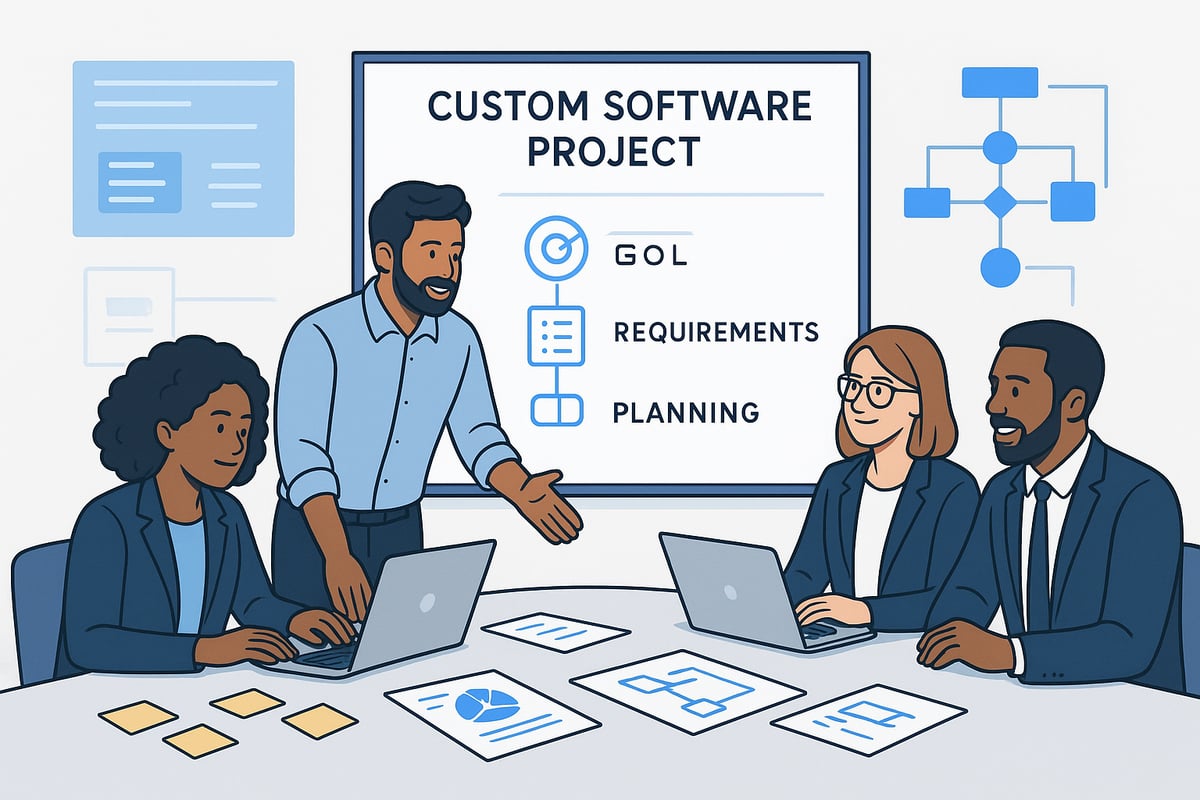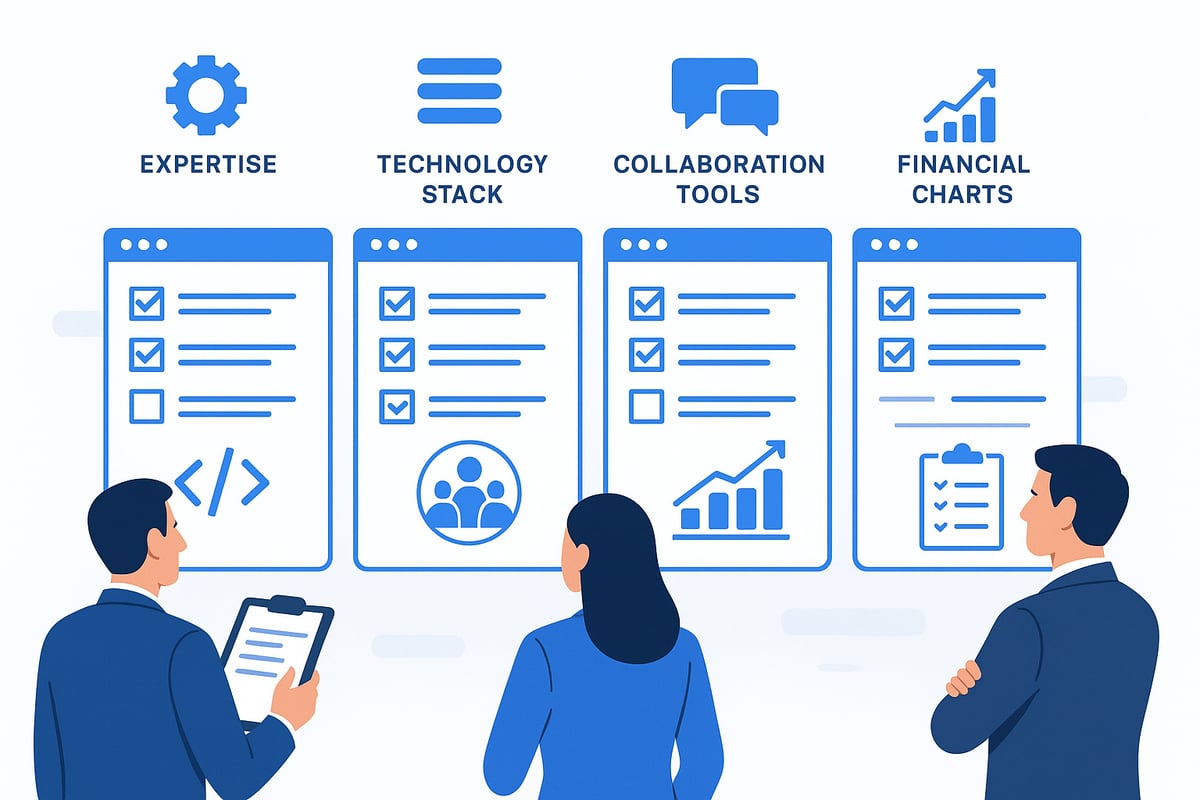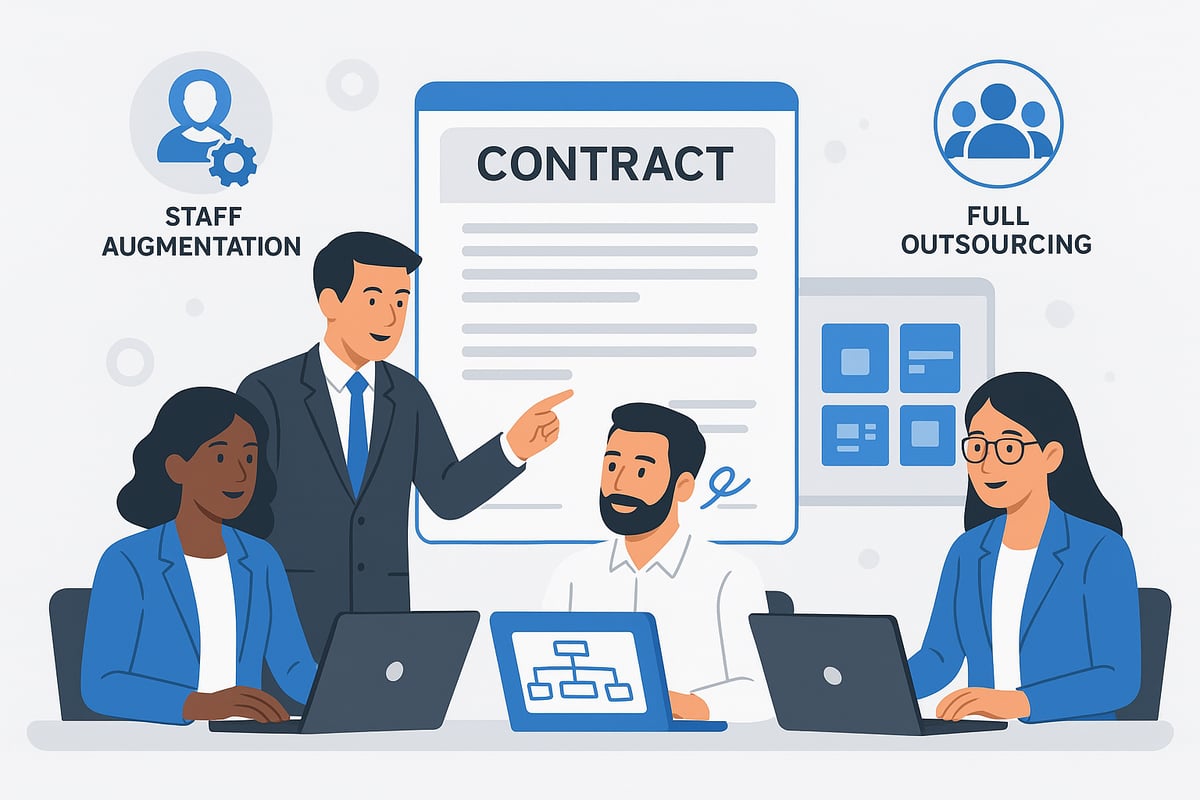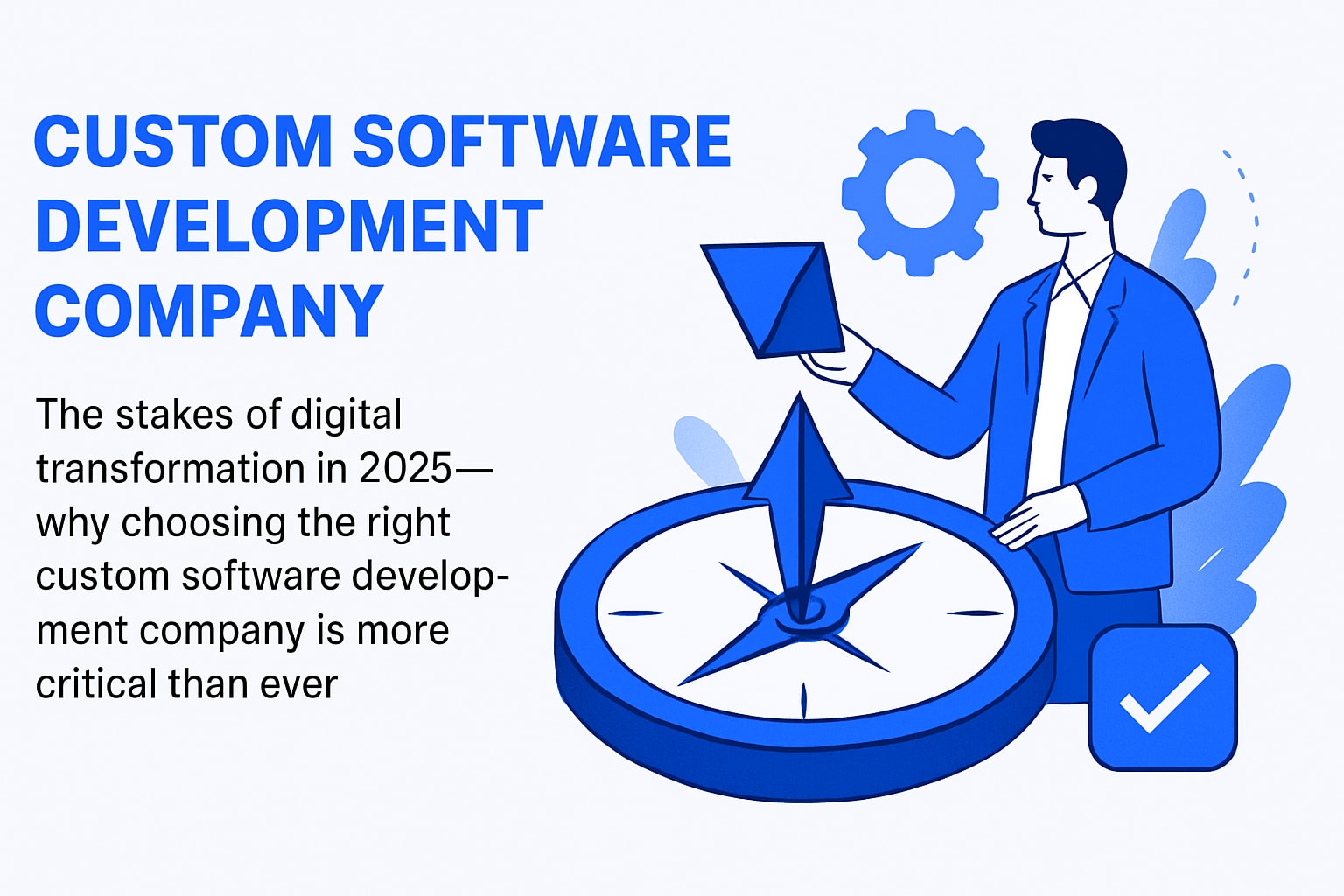Digital transformation is accelerating across every industry in 2025, making your choice of a custom software development company more important than ever. As organizations race to innovate, the demand for tailored software has skyrocketed, with top firms like BairesDev delivering over 1,250 successful projects.
Yet, the risks are real. Many businesses face cost overruns, missed deadlines, and a lack of specialized expertise when choosing the wrong partner. The consequences can be costly, both financially and strategically.
This guide will give you actionable steps and expert insights to confidently evaluate, select, and engage the right custom software development company for your 2025 business goals. You will learn how to assess your needs, apply the best evaluation criteria, vet technical expertise, compare engagement models, ensure cultural alignment, and protect your investment.
Step 1: Assessing Your Business Needs and Project Scope
Understanding where your business stands and where it needs to go is the foundation for selecting the right custom software development company. Taking the time to map out your needs will prevent costly missteps and set your project up for success.

Understanding Project Goals and Outcomes
Start by defining your core business objectives. Are you aiming to increase operational efficiency, launch a new product, or modernize legacy systems? Each goal shapes the kind of custom software development company you need. For example, many enterprises now prioritize modernization to boost speed and scalability, especially when legacy systems hold them back.
Think about the return on investment you expect. Is your focus on cost savings, revenue growth, or improved customer experience? Align your software goals with broader digital transformation strategies to maximize value. According to Gartner, 70% of digital transformation projects fail due to unclear objectives, which highlights why this step is so vital.
It is also helpful to clarify whether your initiative involves new product development, system integration, or process automation. If you are unsure where to begin, reviewing a Custom Development Explained guide can provide foundational insights into aligning business needs with tailored software solutions.
Determining Functional and Technical Requirements
Once you have set your goals, detail the functional and technical requirements for your project. List the must-have features, integrations, and scalability needs. Should your custom software development company build a cloud-native solution, incorporate AI, or enable no-code workflows? Your industry may influence this decision, as different sectors benefit from specific technologies.
Consider which technology stack makes sense for your project. Will you deploy on AWS, Azure, or Google Cloud? Each platform offers unique strengths in security, scalability, and integration. Engage IT, operations, and end-users in requirements gathering to capture all perspectives and avoid missed details.
Do not overlook regulatory, security, and compliance requirements. These considerations are especially important for sectors like healthcare or finance. The right custom software development company will help you anticipate these needs, ensuring your solution meets industry standards and is future-proof.
Setting Budget, Timeline, and Resource Constraints
Establishing a realistic budget and timeline is critical before you approach any custom software development company. Start by outlining your financial range and expected delivery date. Remember to factor in internal resources for project oversight and collaboration.
Identify major cost drivers, such as the level of customization, third-party integrations, or adoption of emerging technologies. Flexible pricing models offered by leading providers can help you optimize spending and allocate funds where they matter most.
Plan for potential scope changes and create contingency strategies. This approach ensures you are prepared for unexpected challenges, keeping your project on track and within budget. By thoroughly scoping your needs, you lay the groundwork for a successful partnership and a smooth software development journey.
Step 2: Key Criteria for Evaluating Custom Software Development Companies
Selecting the right custom software development company is a pivotal decision that can shape your project's success. With so many options, knowing what to look for helps you filter the noise and focus on true partners. Use these criteria to guide your evaluation, reduce risks, and set your business up for long-term growth.

Company Experience and Industry Expertise
Start by looking at how long the custom software development company has been in business and the number of projects they have delivered. A proven track record—think 1,250+ projects across 130+ sectors—shows stability and adaptability. Industry expertise matters too. If your company operates in healthcare, fintech, or retail, you want a partner who understands your market's challenges and regulations.
Review case studies and ask for references from similar projects. Client testimonials offer real-world insights into reliability and outcomes. For a structured checklist, consult resources like Criteria for Selecting Software Development Companies to help benchmark each provider against essential standards.
Technical Proficiency and Technology Stack
A top custom software development company should demonstrate deep technical skills in your required domains. Assess their expertise in cloud platforms, AI, mobile, web, and API development. Certifications—such as AWS, Google Cloud, or ISO 27001—signal a commitment to quality and security.
Check if the team is up to date with the latest trends, including AI/machine learning, no-code, and agentic AI. Ask about their experience with tools and platforms relevant to your needs. For instance, do they have in-house specialists for GenAI, IoT, or advanced integrations? The right technical foundation ensures your solution is future-proof and scalable.
Development Process and Methodologies
The development process shapes everything from speed to quality. Ask the custom software development company about their software development lifecycle (SDLC). Agile, iterative, or DevOps-driven approaches typically deliver faster results and adapt better to change.
Look for robust quality assurance, continuous integration/continuous deployment (CI/CD) pipelines, and strong security practices. Techniques like shift-left testing and automated QA can catch issues early and save costs. Understanding their approach helps you predict delivery timelines and manage risks.
Communication, Collaboration, and Transparency
Communication is the backbone of any successful project. Evaluate how the custom software development company handles updates, feedback, and reporting. Do they use modern project management tools? Is there a clear schedule for meetings and progress tracking?
Cultural and time-zone alignment can make or break collaboration. Flexible engagement models—such as staff augmentation, dedicated teams, or full ownership—offer options that fit your workflow. Transparency in issue resolution, feedback loops, and status updates ensures you always know where your project stands.
Financial Stability and Scalability
Your chosen custom software development company must be able to scale with your business. Investigate their financial health, ability to ramp up resources, and long-term partnership potential. Flexible pricing and engagement models are a plus, letting you adapt to evolving needs.
Check if they can quickly add developers or specialists as your project grows. A stable partner reduces risk and supports your strategic goals. This approach helps you avoid disruptions and maintain momentum throughout the software lifecycle.
Step 3: Deep Dive—Vetting Technical and Delivery Capabilities
Vetting a custom software development company requires a close look at both technical depth and real-world delivery. You want a partner who can architect scalable solutions, assemble top-tier teams, ensure quality and security, deliver on promises, and provide robust post-launch support. Let’s break down how to thoroughly evaluate these capabilities.

Assessing Architectural and Design Expertise
A custom software development company should demonstrate strong architectural vision and design practices. Look for how they approach modularity, scalability, and security from the outset. Early-stage discovery sessions and blueprinting help reduce risks and clarify expectations.
- Do they use domain-driven design or microservices for flexibility?
- Are their UI/UX standards modern and user-focused?
- Is documentation thorough and clear?
Reviewing their architectural strategies helps you spot if the company can handle complex integrations or legacy modernization. For foundational insights, you may find Custom Software Development Considerations helpful when comparing technical approaches.
Evaluating Talent and Team Structure
The backbone of any custom software development company is its talent. Assess the qualifications of architects, developers, QA engineers, and DevOps staff. Top companies offer access to the top 1% of tech talent or niche specialists.
- Does the company provide cross-functional teams or allow you to select specific experts?
- Are their team members certified or recognized in relevant technologies?
- How do they ensure knowledge transfer within teams?
A transparent team structure ensures smooth collaboration and a higher chance of project success with your custom software development company.
Testing, Quality Assurance, and Security Practices
Rigorous testing and security are must-haves for any custom software development company. Confirm their use of automated testing, regression suites, and real-user monitoring. Strong QA processes catch bugs before launch and ensure performance.
- Do they comply with ISO 27001 or similar standards?
- Are there clear rollback and disaster recovery strategies?
- How do they handle ongoing vulnerability assessments?
A company that prioritizes QA and security will protect your data and brand reputation, while reducing costly post-launch surprises.
Delivery Track Record and Portfolio
A custom software development company’s track record tells you whether it can deliver consistently. Analyze their portfolio for similar projects and outcomes. Request references and check for on-time delivery and responsive post-launch support.
| Metric | What to Check |
|---|---|
| Project Timelines | Consistency and punctuality |
| Portfolio Diversity | Experience in your industry |
| Reference Quality | Client satisfaction |
A strong delivery record signals reliability and reduces your risk.
Post-Launch Support and Maintenance
Robust support after launch is non-negotiable with any custom software development company. Clarify the scope of maintenance, upgrades, and support services offered. Ask about SLAs for bug fixes, enhancements, and uptime.
- Do they provide proactive monitoring and regular performance updates?
- Can they optimize costs as your usage grows?
- Is there clear documentation and knowledge transfer?
A partner invested in long-term support ensures your solution remains effective and scalable as your business evolves.
Step 4: Comparing Engagement Models, Pricing, and Contracts
Choosing the right engagement model, pricing structure, and contract terms is essential when partnering with a custom software development company. These decisions shape your collaboration, impact your budget, and affect long-term project success. Let’s break down what you need to know to make informed choices.

Engagement Models: Staff Augmentation vs. Dedicated Teams vs. Full Outsourcing
Selecting the right engagement model can transform your experience with a custom software development company. Each model offers unique advantages and fits different project needs.
Here’s a quick comparison table to help clarify:
| Model | Description | Best For |
|---|---|---|
| Staff Augmentation | Supplement your team with external experts | Short-term needs, skill gaps |
| Dedicated Teams | Autonomous group handles end-to-end delivery | Complex, ongoing projects |
| Full Outsourcing | Vendor manages the entire project | Turnkey solutions, minimal oversight |
Staff augmentation is ideal when you need to scale quickly or fill specialized roles. Dedicated teams provide more autonomy and are suited for projects requiring continuous collaboration. Full outsourcing lets the custom software development company manage everything, freeing up your internal resources.
Pricing Structures and Transparency
Understanding pricing models helps you control costs and avoid surprises. A reputable custom software development company typically offers three main pricing options:
- Fixed-Price: Best for well-defined scopes, with predictable costs.
- Time & Materials: Ideal for evolving requirements, billed by effort.
- Milestone-Based: Payments tied to agreed deliverables.
Transparency is key. Make sure estimates, billing, and change management processes are clear from the start. For deeper insights on pricing and engagement models, read Enterprise Software Development Insights.
A transparent custom software development company will walk you through estimates, explain cost drivers, and document all changes.
Intellectual Property (IP) and Data Ownership
Protecting your intellectual property is non-negotiable when working with a custom software development company. Insist on clear contractual terms that outline IP ownership, co-ownership, and rights to data.
Avoid potential vendor lock-in by securing access to all code, documentation, and development assets. Look for companies that prioritize long-term flexibility and ensure you have the ability to transfer or scale your software as needed.
Risk Management and Legal Safeguards
A dependable custom software development company will proactively address risk and legal safeguards. Review liability clauses, NDAs, and data protection agreements in detail.
Check that your partner’s approach covers contingency planning and compliance with regulations such as GDPR or HIPAA. Reliable companies have well-defined escalation paths and risk mitigation strategies, providing peace of mind throughout the project.
Timeline, Deliverables, and Exit Strategies
Define clear milestones, deliverables, and acceptance criteria in your contract with the custom software development company. This clarity ensures everyone is on the same page and helps track progress effectively.
Plan for flexible exit strategies and support for project handover or transition. Discuss how future changes, ongoing maintenance, or scaling will be managed so you’re never left in the dark.
Step 5: Ensuring Cultural Alignment and Effective Collaboration
Finding the right custom software development company is not just about technical skills. It is also about building a relationship that supports open communication, shared values, and long-term growth.
A true partnership goes beyond contracts. It requires clear understanding, honest feedback, and adaptability on both sides.
Communication and Collaboration Practices
Effective communication is the foundation of any successful custom software development company partnership. Look for teams that speak your language fluently, both literally and in terms of business goals.
Time zone overlap matters, especially for daily standups or urgent feedback. Ask about their collaboration frameworks, such as regular video check-ins, shared project boards, and stakeholder workshops. Real-time monitoring and transparent reporting are essential for proactive problem-solving.
For more on building collaborative workflows, see these Essential Software Development Tips 2025 to help you work smarter with your chosen partner.
Company Values, Work Ethic, and Cultural Fit
Beyond skills, a custom software development company should share your values and vision. Are they as invested in your success as you are? Review their mission, work ethic, and client approach.
Signs of strong cultural fit include:
- Proactive communication and honesty
- Commitment to quality and deadlines
- Willingness to go the extra mile
Companies like Big House Technologies and BairesDev are known for their client-centric models, focusing on true partnership over transactional delivery.
Flexibility and Adaptability to Change
Change is inevitable during software projects. Your custom software development company should embrace change, not resist it.
Check their approach to pivoting strategies or scaling teams when requirements evolve. Ask if they have experience with quick ramp-ups, adopting new tech, or shifting priorities mid-project.
A flexible partner will:
- Offer scalable resources
- Adjust timelines and deliverables
- Provide solutions, not excuses
This adaptability keeps your project resilient and on track.
Long-Term Partnership Potential
The best custom software development company is one that grows with you. Look for evidence of long-term client relationships and repeat engagements.
A willingness to invest in ongoing improvement, innovation, and knowledge transfer signals a trusted partner. Review their approach to continuous feedback, post-launch support, and shared success metrics.
Building this kind of relationship leads to better outcomes, faster response to new needs, and greater return on your investment.
Step 6: Making the Final Decision and Onboarding Your Partner
Choosing a custom software development company is a pivotal moment that sets the tone for your project’s success. By now, you’ve gathered insights, compared contenders, and are ready to make a confident, data-driven decision. Let’s break down the final steps to ensure your partnership starts on the right foot.
Shortlisting and Final Evaluation
Create a weighted scorecard that includes expertise, project fit, pricing, and client references when shortlisting your custom software development company. Interview finalists, conduct technical assessments, and check references to validate your choice. For a more structured approach, consider using a methodology for evaluating software solutions that aligns with your specific business needs. This ensures you select a partner who can deliver value and long-term results.
Negotiating and Signing the Contract
Before signing, clarify all terms with your custom software development company. Define the scope, timeline, deliverables, and payment schedules in detail. Double-check legal language on intellectual property, confidentiality, and data protection. Set up clear escalation paths and agree on communication protocols to resolve issues quickly. A transparent contract lays the groundwork for trust and accountability.
Onboarding and Kickoff Best Practices
Successful onboarding with your custom software development company starts with a well-structured kickoff. Establish project governance, assign stakeholder roles, and align on project management tools. Set a regular reporting cadence and feedback loops to encourage collaboration. Clear expectations for change management and risk mitigation keep everyone focused and adaptable from day one.
Continuous Improvement and Relationship Management
Plan for ongoing collaboration with your custom software development company by scheduling regular reviews and retrospectives. Foster transparency, innovation, and knowledge sharing through open communication channels. Set performance metrics and encourage feedback to drive continuous improvement. A proactive approach helps you scale, adapt, and maximize your return on investment over time.
Real-World Success Stories
Look to successful partnerships for inspiration. Rolls Royce leveraged real-time monitoring for operational efficiency, while TicketGalaxy optimized pricing with AI, and Kinesso modernized data infrastructure. Each saw measurable benefits: faster time-to-market, improved scalability, and significant cost savings. These stories highlight the transformative impact of choosing the right custom software development company.
You’ve made it this far—so you know just how crucial it is to pick a custom software partner who truly gets your goals for 2025. After all, the right choice means fewer headaches, more innovation, and software that actually supports your business growth. If you’re ready to speed up your digital journey and want to launch your MVP or next big idea without the usual delays or budget surprises, you don’t have to wait months. Let’s turn your vision into reality faster than you thought possible—Launch Your MVP in Weeks, Not Months.




About Big House
Big House is committed to 1) developing robust internal tools for enterprises, and 2) crafting minimum viable products (MVPs) that help startups and entrepreneurs bring their visions to life.
If you'd like to explore how we can build technology for you, get in touch. We'd be excited to discuss what you have in mind.
Other Articles
Curious about how much freelance Bubble developers make per project? In our latest survey, we reveal earnings, project types, and career insights from developers worldwide. Read on to learn about hourly rates, top-earning niches, and the booming no-code industry!
Unlock 2026 success with our enterprise automation consulting guide covering trends, best practices, case studies, and actionable strategies for measurable ROI.
Unlock your development team's success in 2025 with expert strategies, key roles, and future trends. Build, structure, and lead high-performing teams today.

